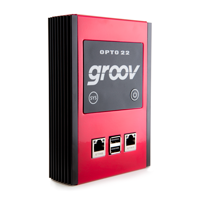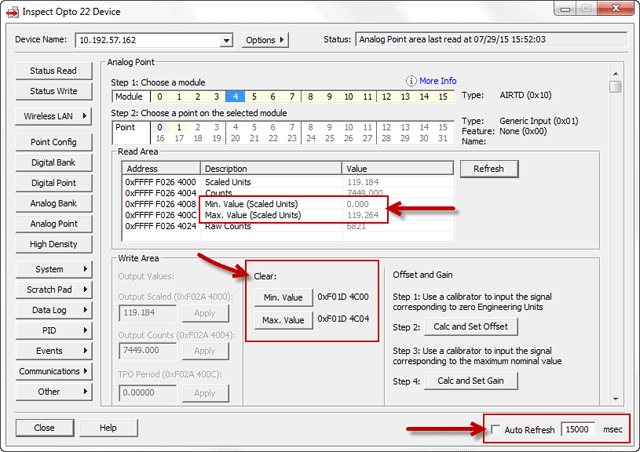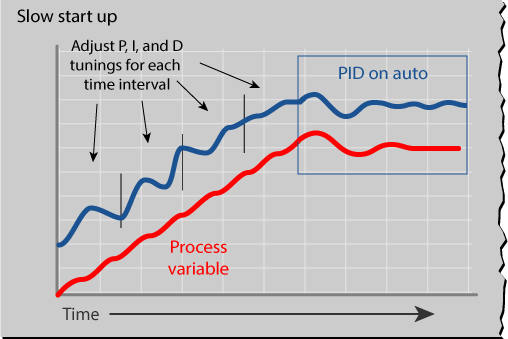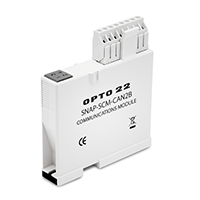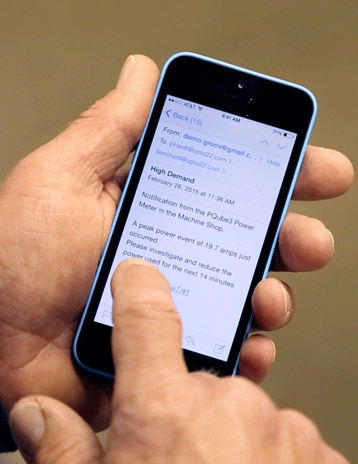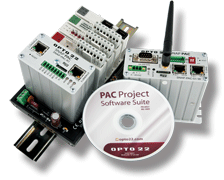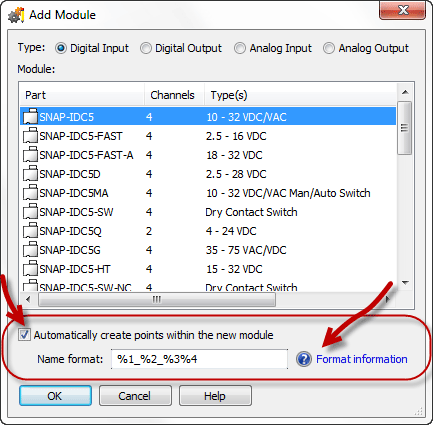Do you have a groov Box?
If so, you'll want to update it with the latest version of groov Admin, the software that helps you administer the groov Box.
groov Admin is what you use to configure network connections, back up and restore groov projects, set up system time, and so on.
Read More
Topics:
groov,
Updates,
optonews,
OptoNews 2015-07-29
Two new groov how-to videos show you all about:
Events & notifications. Configuring events you want to log, checking event status, and using the event log with or without custom message text.
Read More
Topics:
Videos,
groov,
optonews,
Training,
OptoNews 2015-07-29
Of course you can include a trend in your PAC Display HMI or groov mobile operator interface and watch a value in your SNAP PAC System rise and fall over time. Or you can inspect a quick "plot" of it in PAC Control Pro's Debug mode.
But what if you just want to take a quick look at how high or how low an analog value has been, say, today?
This tip shows you how to do that using PAC Manager.
Read More
Topics:
Tips,
optonews,
PAC Project,
OptoNews 2015-07-29
50 or 60 Hertz - Roughly.
Measure the main power grid frequency, he said. It will be fun, he said…. Actually, pretty sure I said something like, “it will be easy”... and I was mostly right, and best of all, it did turn out to be fun!
It seemed like both a reasonable and easy request. The requirements were to measure the mains power grid frequency to a resolution of 0.01 Hertz, and to do it every 125 milliseconds (roughly; it could be a max of 200 milliseconds, but not much longer).
Why? In this case, the chase is better than the catch. It's enough to say the customer had his reasons, and this blog is about the chase.
Read More
Topics:
Energy management,
Process control,
groov,
Internet of Things,
Remote monitoring,
Electronics,
Tips,
IoT,
OEM,
I/O
Loop the loop.
PID loops are used in a lot of different applications, and for good reason: they help keep our world under control. If you need to control a process temperature or pressure, you probably are going to use a PID loop. But are they always the right solution?
Ultra quick review; a proportional-integral-derivative control loop (or
PID controller) compares a setpoint against a measured input value, and depending on the error, changes a control variable (output). It’s all about math. A PID loop is all about running a mathematical formula over and over at a specific rate.
The most common example of a PID loop that I often talk about in our monthly training class is the cruise control on a car. The speed of the car is the input, the accelerator is the output and the setpoint is what speed the car is doing the moment the driver presses the “set” button.
PID loops are so useful that sometimes we too quickly decide to use a one in a process when it may not be the best solution to the problem. In this week’s blog we are going to take a look at one instance where use of a PID loop may not be the best tool for the job.
Read More
Topics:
Process control,
PLCs,
Remote monitoring,
Tips,
IoT,
PACs,
I/O
Do you have devices on a Controller Area Network? Now you can communicate with them using the SNAP-SCM-CAN2B serial communication module and a new CAN RX/TX Integration Kit.
New R2.0b firmware on the SNAP-SCM-CAN2B makes it possible to both transmit and receive data.
When you enable transmit functionality, all data communications between the module and the SNAP PAC brain or controller are ASCII encoded and frame delimited for robust communications.
Read More
Topics:
Updates,
optonews,
New products,
Integrators,
OptoNews 2015-07-15,
I/O
We rely on our smartphones so much now. It's hard to remember when I couldn't instantly:
- find out the traffic between here and where I'm headed
- message my friend to say I'll be late
- take a photo of anything and send it or upload it
- see how many steps I've taken today
- check stocks and the news and the weather
- listen to music/make music/watch a video/play a game
- summon a car or order lunch or...
So seriously, why would I want that convenience to stop with my personal life?
What I'd like is to also see status and data from equipment and systems I'm responsible for, and especially to be notified if something's out of line.
Read More
Topics:
Energy management,
Process control,
Discrete control,
groov,
Internet of Things,
Remote monitoring,
optonews,
OptoNews 2015-07-15
Plan ahead to enjoy the fall color and learn about Opto 22's versatile SNAP PAC System at the same time this September.
Whether you're monitoring remote pumps and valves, tracking energy data, controlling processes in a large factory, or doing a wide variety of other automation tasks, you'll find the SNAP PAC System reliable and scalable.
Read More
Topics:
Case studies,
groov,
optonews,
PACs,
Training,
OptoNews 2015-07-15,
I/O
Suppose you need to monitor temperatures from several thermocouples wired to a SNAP-AITM-8 analog input module.
Or maybe you have a bunch of switches that are all wired to a high-density digital output module like the SNAP-ODC-32-SNK.
Here's a tip for anyone who needs to add several similar I/O points to a PAC Control strategy: you can save a lot of time by adding them automatically.
Read More
Topics:
Tips,
Machine builder,
optonews,
OptoNews 2015-07-15,
I/O
Star Struck:
From a young age I have been looking up at night. Not sure exactly when I fell in love with astronomy, but I can recall looking up at the stars every chance I got as a kid.
I have ebbed and flowed with the amount of time and equipment I have had to spend on the hobby. In Australia I had a fully enclosed fiberglass domed observatory, which I chose to not ship over when my family moved to The States, but the desire to look up has not gone away.
Only the constellations at the horizon can be seen in both hemispheres, and even those look upside down compared to what I used to see. So I wanted to get something up and running fast here that would allow me some time to get my bearings in the sky and to share my new stars with my mates back in Australia via my personal website.
In this week's blog, I would like to share what astronomy tools I currently have set up, thanks to some Opto 22 hardware and groov.
Read More
Topics:
Videos,
Process control,
Discrete control,
groov,
Internet of Things,
Remote monitoring,
Electronics,
Tips,
IoT,
PACs

